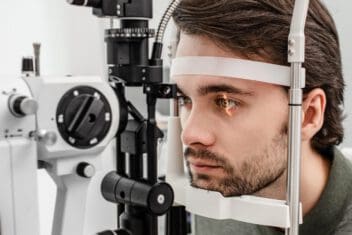How Often Should You Get Your Eyes Checked? A Guide for All Ages
Home / Vision Education Center /
Last Updated:
Table of Contents
For most of our lives, doctors recommend getting an eye exam at least once every two years.
From about 6 years old to adulthood, that frequency temporarily increases to once a year. Doctors also recommend senior adults get yearly exams, as age is a major risk factor in the development of several eye health problems.

As always, listen to your doctor and follow their recommendations for your specific eye health.
| Age Group | Recommended Exam Frequency |
| Birth–2 years old | At least once |
| 3–5 years old | At least once |
| 6–17 years old | Every year |
| 18–39 years old | Every 2 years |
| 40–64 years old | Every 2 years |
| 65+ years old | Every year |
Infancy (Birth–2 years old)
The general recommendation is that most infants get at least one eye exam, ideally between 6 and 12 months of age. This can help catch any signs of eye and vision problems before they have much time to develop. If any issues are detected, it can allow for early intervention.
Early Childhood (Ages 3–5)
Early childhood, like infancy, is often thought of as a low-risk period for the development of eye and vision problems. Doctors recommend a child get at least one exam during this period of development.
You deserve clear vision. We can help.
With 135+ locations and over 2.5 million procedures performed, our board-certified eye surgeons deliver results you can trust. Your journey to better vision starts here.
From Childhood Through the Teen Years (Ages 6–17)
This next period of development is one of the most important in a person’s life. The body and mind will undergo many changes during this time. Even minor vision problems can impact important elements of a person’s life, such as the quality of their education.
Before a child enters first grade and every year until adulthood, it is recommended that they get an eye exam. This also marks the beginning of a child’s ability to take a more traditional vision test, as they will learn to read during this period of their life. They also develop the communication skills to help a doctor more thoroughly identify potential problems and find solutions.
Adulthood (Ages 18–39)
Unless a person is in an at-risk group, adulthood marks a period of less frequent exams that will continue for several decades. At this age, doctors usually recommend an adult is examined once every two years.
You deserve clear vision. We can help.
With 135+ locations and over 2.5 million procedures performed, our board-certified eye surgeons deliver results you can trust. Your journey to better vision starts here.
Middle Age (Ages 40–64)
For most people, not much changes in recommendations for this period of adulthood. The standard recommendation is still an exam at least once every two years.
At 40, some groups such as African Americans begin to become more at risk for glaucoma. For people in these groups, a dilated eye exam every two years should still help to identify glaucoma early and allow for timely intervention if necessary. Your doctor may recommend more frequent eye exams if you fall in this group.
Older Adults (Ages 60+)
Between the ages of about 60 to 65, doctors start to recommend annual eye exams. The eye is one of several organs that deteriorates with older age, and some vision problems are essentially inevitable.
Regular exams help you stay aware of your current eye health and potential solutions to any problems you may be developing.
What Warrants More Frequent Examinations?
All of the above recommendations apply only to people who are asymptomatic or otherwise at low risk of developing eye or vision problems. Many different factors can warrant more frequent exams, such as these:
- Diabetes
- A family history of ocular disease
- Taking medications with side effects related to vision or the eyes
- A past or recent eye injury
- Any progressive deterioration or change to your vision
As a rule, always listen to your doctor’s recommended exam schedule even if it is more frequent than anything you read online. Your doctor has a better understanding of your specific eye health needs.
Get your eyes checked immediately if you develop any sudden changes to your vision or notice symptoms such as pain or irritation in your eyes. The standard recommended schedule is only for people who otherwise show no signs of potential health problems.
A standard eye exam carries essentially no risk when properly administered. If you wish to get examined more frequently, you are welcome to do so. However, getting examined more than once a year may be a waste of resources unless your doctor has recommended such a frequent schedule or you notice any changes to your eyes or vision.
You deserve clear vision. We can help.
With 135+ locations and over 2.5 million procedures performed, our board-certified eye surgeons deliver results you can trust. Your journey to better vision starts here.
References
- Comprehensive Eye Exams. American Optometric Association.
- Keep an Eye on Your Vision Health. (October 2020). U.S. Food and Drug Administration.
- Frequency of Ocular Examinations – 2015. (March 2015). American Academy of Ophthalmology.
- As People Age, Regular Eye Exams Are Important. (May 2019). The Washington Post.
This content is for informational purposes only. It may have been reviewed by a licensed physician, but is not intended to serve as a substitute for professional medical advice. Always consult your healthcare provider with any health concerns. For more, read our Privacy Policy and Editorial Policy.